Sandra Day O’Connor, who made history as the first woman on the Supreme Court, dies at 93

Ashley Murray, Alabama Reflector WASHINGTON — The first woman to serve on the nation’s highest court is dead at 93. Sandra Day O’Connor, a groundbreaking justice on the U.S. Supreme Court, died Friday in Phoenix, Arizona of complications related to advanced dementia, probably Alzheimer’s, and a respiratory illness, according to an announcement from the court. President Ronald Reagan nominated O’Connor in 1981, and she was confirmed by the full Senate, 99-0, in September of that year. The moderate O’Connor, who served on the bench until her retirement in 2006, was often the decisive vote in major cases that reached the Supreme Court in her nearly quarter-century as associate justice. The justices issued rulings in high-profile cases during O’Connor’s tenure, including Bush v. Gore, which settled the 2000 presidential contest in George W. Bush’s favor, and Planned Parenthood of Southeastern Pennsylvania v. Casey, a 5-4 decision that affirmed the constitutional right to an abortion but with leeway for states to impose some restrictions. O’Connor sided with the majority in both cases. “She was consequential,” journalist and historian Evan Thomas told the National Archives in 2019 while promoting his biography “First: Sandra Day O’Connor.” She cast the so-called “swing vote” 330 times in 24 years, Thomas said. “And where it really mattered was in abortion rights and affirmative action,” he said, referring to several cases, including Grutter v. Bullinger, which upheld the consideration of race in the University of Michigan’s law school admissions. In 2022, O’Connor’s successor, Justice Samuel Alito, wrote the majority opinion overturning Planned Parenthood v. Casey and Roe v. Wade, striking down abortion rights at the federal level. A ‘true public servant’ and ‘trailblazer’ Chief Justice John Roberts said in a statement Friday that O’Connor “blazed a historic trail as our Nation’s first female Justice.” “She met that challenge with undaunted determination, indisputable ability, and engaging candor. We at the Supreme Court mourn the loss of a beloved colleague, a fiercely independent defender of the rule of law, and an eloquent advocate for civics education. And we celebrate her enduring legacy as a true public servant and patriot,” he said. Senate Minority Leader Mitch McConnell of Kentucky said in a statement that the “nation mourns the passing of a towering figure in the history of American law.” “… From her election as the first female Majority Leader in the history of American legislatures to her confirmation as the first female Justice of the U.S. Supreme Court, Sandra Day O’Connor led with a brilliance and conviction that disarmed resistance. Her vote on the court frequently determined the majority in landmark cases, and the legacy of her role in landmark decisions reviving federalism during her first several terms on the Court continues to resound in Constitutional jurisprudence,” McConnell said. In the mid-1990s and 2000, O’Connor provided decisive votes in two 5-4 decisions that found federal laws unconstitutional under the Commerce Clause, including sections of the Violence Against Women Act and a federal law that criminalized carrying a firearm within 1,000 feet of schools. Senate Majority Leader Chuck Schumer of New York said O’Connor was the “conscience of the Court.” Schumer said in a statement issued Friday that O’Connor “was one of the true historic figures of the 20th century. In decision after decision, Sandra Day O’Connor was often the key vote in defending the rights of Americans—in protecting clean air, in protecting women’s rights, in protecting against discrimination, in protecting voting rights. I join Americans all across the country in mourning her passing today.” Speaker of the House Mike Johnson of Louisiana described O’Connor as a “trailblazer” and “legal giant” in a Friday morning post on X. “As the first woman to ever serve on the Supreme Court, Justice O’Connor inspired a generation of women — including the five female Justices that succeeded her — to chart a path that previously seemed unattainable,” he said. “Despite never serving as Chief Justice, she was widely regarded as the most powerful Justice on the bench during her tenure.” The women who followed O’Connor’s appointment to the court included Ruth Bader Ginsburg, nominated by former President Bill Clinton in 1993; Sonia Sotomayor and Elena Kagan in 2009 and 2010, both nominated by former President Barack Obama; Amy Coney Barrett, nominated by former President Donald Trump in 2020; and Ketanji Brown Jackson, nominated by President Joe Biden in 2022. Obama released a statement Friday recounting the well-known story of O’Connor’s challenges finding a job in the legal field as a woman in the 1950s, when she was asked about her typing skills and offered work as a legal secretary. “Fortunately for us, she set her sights a little higher – becoming the first woman to serve as a U.S. Supreme Court justice,” Obama said. “As a judge and Arizona legislator, a cancer survivor and child of the Texas plains, Sandra Day O’Connor was like the pilgrim in the poem she sometimes quoted – forging a new path and building a bridge behind her for all young women to follow. Michelle and I send our thoughts to Sandra’s family and everyone who learned from and admired her.” From the Southwest to the nation’s capital O’Connor was born on March 26, 1930, in El Paso, Texas, and grew up on a ranch in Arizona. She graduated near the top of her law school class at Stanford University in 1952. O’Connor began her law career as deputy county attorney of San Mateo County, California, followed by a position as a civilian attorney for Quartermaster Market Center, Frankfurt, Germany, from 1954 to 1957. O’Connor practiced law in Maryvale, Arizona, until 1960 and went on to serve as assistant attorney general of Arizona from 1965 to 1969. She followed her time in the attorney general’s office with multiple terms in the Arizona State Senate beginning in 1969 and eventually serving as the body’s majority leader. In 1975, she was elected as a Maricopa County Superior Court judge and served until 1979, when she was appointed to the Arizona Court
Senate plots to break Tommy Tuberville’s hold on military nominees
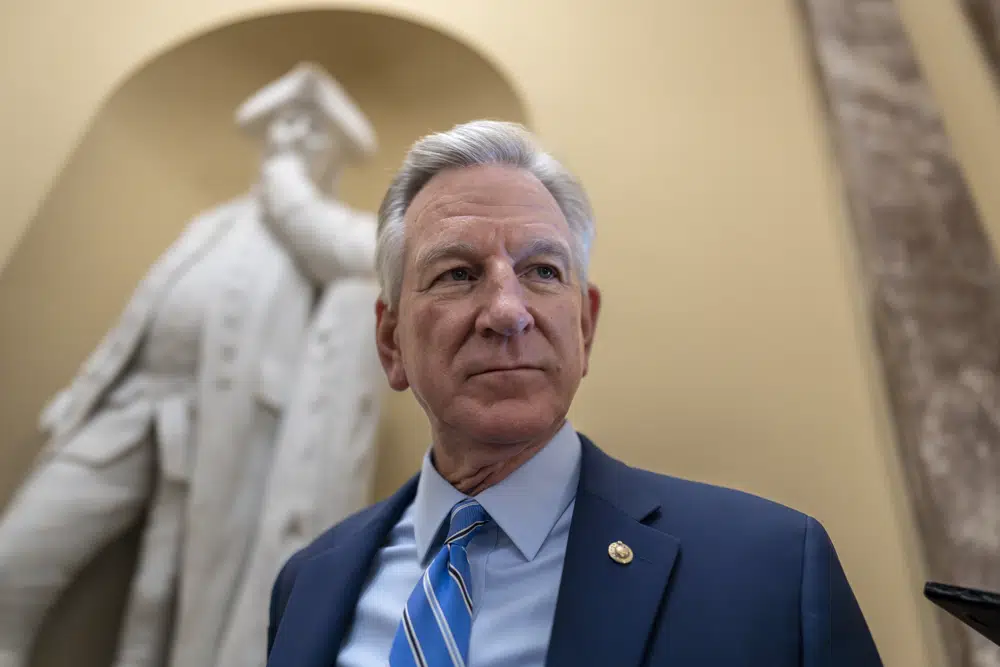
Democrats on the Senate Rules Committee advanced a resolution on Tuesday that would allow the Senate to override U.S. Sen. Tommy Tuberville’s (R-Alabama) nine-month hold on military promotions. Tuberville spoke at length with Alabama reporters on Wednesday about this development. “What’s happening now, that I have been about nine or ten months of holds on admirals and generals – flag officers, the Democrats have said we are just going around Coach,” Sen. Tuberville said. “We are going to go to the Rules Committee (and) pass a new rule that we can go around him, and for the next year and a half, we won’t have holds from the minority part of the Senate. That will probably happen in maybe around the first of December. It did come out of committee. It did come out of the rules committee, so now they will have the vote in the next couple of weeks to go around me.” Senate rules require 60 votes to change the rules, meaning that with a 51 to 49 split, Democrats need Republican support to pass the rule change. “They have got to have nine Republicans,” Tuberville said. “I can’t imagine nine Republicans siding with the Democrats. Number one against pro-life. Number two against executive overreach and then siding with the Democrats on anything because they don’t side with us on anything.” The resolution was led by Democratic Sen. Jack Reed of Rhode Island and independent Sen. Kyrsten Sinema of Arizona. The rule would temporarily change the process, allowing for the nominees to be approved en masse, letting the chamber more quickly vote on the promotions that Tuberville has slowed with his opposition. It would require the support of all Democrats and independents and at least nine Republicans. Several GOP Senators have expressed their frustrations with Tuberville over this publicly. It remains to be seen if there are nine of them willing to stand with Democrats and risk backlash from the pro-life movement over it to pass the rule change. Several Republican Senators have become frustrated with Tuberville’s intransigence on this and have spent hours on the Senate floor criticizing him on this topic – hours that could have been spent confirming military promotions simply by bringing a petition to override Democratic Minority Leader Chuck Schumer’s (D-New York) stranglehold on the Senate calendar. Tuberville said he has had no assurances from his Republican colleagues that they will not cross over and vote with Democrats on this rule change. “I have not been assured,” Tuberville said. “I think there is going to be some people on the Republican side that say that we need to get this over with and not hold up these promotions. We don’t need to do that because it is not affecting readiness at all. I do have a couple of things that I am working on maybe to avoid this to get this over with before a vote happens. Right now, the Republican Party is going to have to decide whether they are going to be pro-life or vote for this resolution to pass to go around me. It is disturbing sometimes. I am not establishment. I vote for the people of Alabama, and I hope the rest of our delegation would vote for their state, and if they did that, they would vote against the Democrats.” One reporter asked if Tuberville’s holds were pro-life versus the military. Sen. Tuberville objected to that verbiage. “These holds are not pro-life versus military,” Tuberville answered. “The Republicans – all Republicans – we’re pro-life, and we’re also for the military. The Democrats are not for either. They are definitely not for the life of the unborn, and they really don’t support the military like Republicans do, so let’s go down that avenue.” Tuberville remains staunchly opposed to the Pentagon’s abortion policy, which allows servicemembers and their families stationed in states where abortion is restricted to take time off and be reimbursed for travel expenses for the procedure. Critics say his tactic of holding up the promotions threatens military readiness and unfairly punishes service members. “I am doing what is right for the people of Alabama and the American people, and hopefully my Republican colleagues stick with me on that,” Tuberville concluded. Senate Minority Leader Mitch McConnell (R-Kentucky) and every other Republican on the committee voted against the resolution, though they have told reporters that they are still trying to find a solution with Tuberville. The body could bring the nominations as part of regular order as the Founders intended, or the Defense Department could reverse the controversial policy change prompting Tuberville’s hold in the first place. Democrats are unwilling to compromise on either point and have rejected a plan in the Republican-controlled House of Representatives’ version of the National Defense Authorization Act (NDAA) that would override the Defense Department policy that created this conflict. To connect with the author of this story or to comment, email brandonmreporter@gmail.com.
Congress sends stopgap spending bill to Biden’s desk, averting shutdown for now
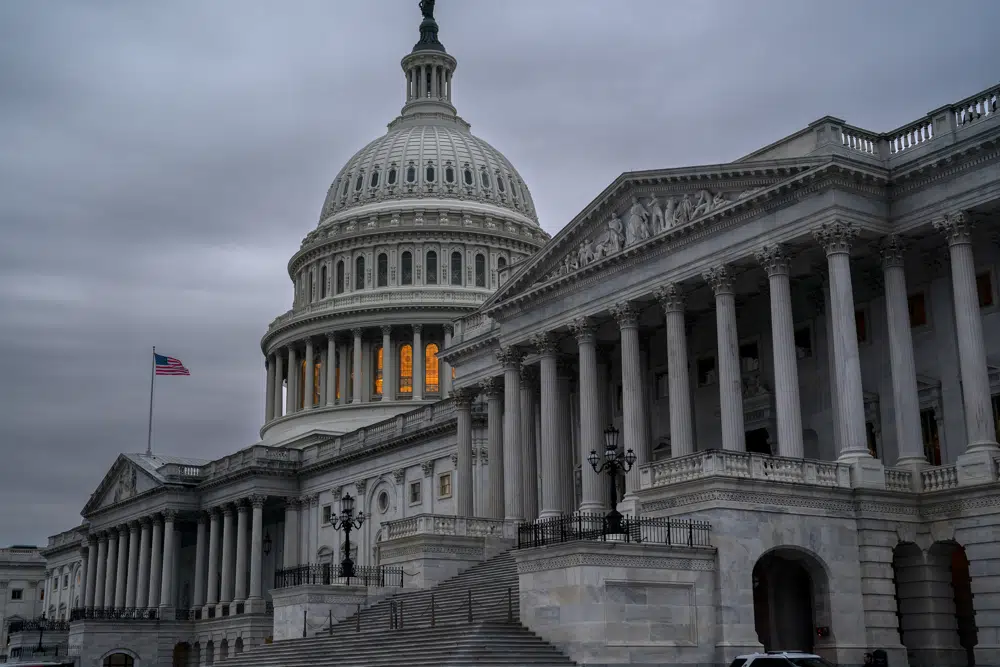
Jennifer Shutt, Alabama Reflector WASHINGTON — U.S. senators voted 87-11 to approve legislation Wednesday that would fund the government into next year, clearing the measure for President Joe Biden’s signature. The stopgap spending bill, sometimes called a continuing resolution or CR, would fund part of the government until mid-January and the rest of the programs within the annual appropriations process through early February. But many hurdles likely remain before a final deal is reached on full-year spending. Senate Appropriations Chair Patty Murray, a Washington state Democrat, said just before the bill passed that she’s already turned her attention to “what happens next.” “Because avoiding a shutdown is so very far from mission accomplished,” Murray said. “We have a lot of work to do after the dust settles and before the next shutdown deadline comes up. Now is not the time to pat ourselves on the back.” That conference process between the House and Senate, Murray said, will require “listening to the other side, making some tough decisions, leaving out partisan nonstarters, and writing a bill that can actually pass into law.” “That is going to make a difference for people we represent at home,” Murray said. The House voted 336-95 to approve the stopgap legislation on Tuesday, and Biden is expected to sign it before current funding expires Friday at midnight. House members abruptly canceled further votes and left D.C. for their Thanksgiving recess on Wednesday morning, after far-right members objected to advancing a different spending bill. More time needed The stopgap spending bill is intended to give the Republican House, Democratic Senate, and White House more time to reach agreement on the dozen full-year spending bills. Congress was supposed to finish its work by the start of the fiscal year on Oct. 1 but is relying on the stopgap spending bill to continue current funding levels until a deal is negotiated. Reaching agreement is a well-established practice for the four leaders of the Appropriations Committees — Senate Chair Murray; Senate ranking member Susan Collins, a Maine Republican; House Chair Kay Granger, a Texas Republican; and House ranking member Rosa DeLauro, a Connecticut Democrat. The four lawmakers have years of experience working out bipartisan deals on spending bills as well as other legislation, but they all often caution against politics or outside influences meddling in those negotiations. “Appropriators left to their own devices” can reach agreement, they often say. But they rarely are left to do their work. New faces in the talks Sign-off on the final dozen full-year bills also falls to the four congressional leaders. Senate Majority Leader Chuck Schumer, a New York Democrat, and Senate Minority Leader Mitch McConnell, a Kentucky Republican, have plenty of experience negotiating spending bills and other consequential legislation with each other. Joining them at the table this year will be newly elected House Speaker Mike Johnson, a Louisiana Republican, and House Democratic Leader Hakeem Jeffries, of New York. Both are new to forging agreement on the annual appropriations bills, which last year totaled about $1.7 trillion. Congress will have until Jan. 19 to come to find compromise on the Agriculture-FDA, Energy-Water, Military Construction-VA, and Transportation-HUD spending bills. They’ll have until Feb. 2 to reach a deal on the Commerce-Justice-Science, Defense, Financial Services, Homeland Security, Interior-Environment, Labor-HHS-Education, Legislative Branch, and State-Foreign Operations appropriations bills. The Senate drafted its dozen spending bills to the total spending levels in the debt limit law that Congress approved this summer. But House Republicans wrote their bills more than $100 billion below those levels and added in dozens of hot-button policy proposals that stand no chance of becoming law. Collins said Wednesday that she met with Johnson last week to talk about total funding levels and the supplemental spending package that Congress could pass in the coming weeks to fund Israel, Ukraine, Taiwan, and U.S. border security. Ultimately, she said, congressional leaders will be the ones who decide whether to stick to the spending levels in the debt limit law or go in a different direction. “To me, it should be guided by the numbers in the (Fiscal Responsibility Act), plus the side agreement that was worked out between Speaker McCarthy and President Biden,” Collins said, referring to the debt limit deal from earlier this year and former House Speaker Kevin McCarthy. In the meantime, she suggested, the Senate could take up a four-bill spending package that includes the Commerce-Justice-Science, Energy-Water, Defense, and Labor-HHS-Education spending bills. “That might be a good four-bill package that we could bring,” Collins said. A senior appropriator, speaking on background, said Wednesday that a proposal was circulating that would have the Senate turn to that exact four-bill spending package once it gets back from the Thanksgiving recess. The Senate has approved a three-bill package with a broadly bipartisan vote and the House has approved seven bills without Democrats’ support. House exit The House was set to vote on two additional spending bills this week, but Republican leaders announced late Wednesday morning the chamber was done until after the Thanksgiving break. The canceled votes came after the House was unable to adopt the rule that would have set up debate on the Commerce-Justice-Science spending bill, amid anger on the stopgap spending bill from far-right members of the party. Senate Republican Whip John Thune, of South Dakota, said Wednesday it will be difficult to work out agreements between the two chambers on the dozen appropriations bills before the new deadlines. “One of the biggest challenges, obviously, is there’s a difference in numbers between the House and the Senate,” Thune said, noting the two chambers will have to deal with that when they begin the conference process. “And I think we have to give that a chance,” Thune said. “You’ve got a new speaker over there. It seems like people want to cooperate a bit, so let’s see if they can move bills.” Alabama Reflector is part of States Newsroom, a network of news bureaus supported by grants and a coalition of donors as a
Terri Sewell votes for bipartisan plan to avoid government shutdown

On Tuesday, the U.S. House of Representatives voted in favor of a bipartisan plan to keep the government funded through January avoiding a government shutdown. New Speaker of the House Mike Johnson (R-Louisiana) was abandoned by the ultra-conservative Freedom Caucus so he was forced to negotiate with Democrats to craft the package to keep the government operating. Congresswoman Terri Sewell (D-AL07) voted with Speaker Johnson in favor of the Continuing Resolution (CR) to keep the federal government open and avoid the potentially disastrous consequences of a shutdown. The CR funds the federal government at current levels through January 19th for certain agencies and February 2nd for others. It passed the House of Representatives by an overwhelmingly bipartisan vote of 336 to 95 and will now make its way to the U.S. Senate. “We in Congress have a responsibility to the American people to keep the government open and protect the programs that families rely on,” said Rep. Sewell. “While I have some concerns about the staggered funding deadlines, this measure prevents a shutdown and protects against the extreme cuts pushed by my colleagues across the aisle. Families in Alabama can breathe a sigh of relief knowing that their Thanksgiving plans will not be affected by a government shutdown.” Sewell wrote on X, “Tonight, I voted for a bipartisan measure to keep the government open and protect the programs that Alabamians rely on. While I have concerns about the staggered funding deadlines, this measure prevents a shutdown and protects against extreme cuts pushed by my GOP colleagues.” Two Democrats and 93 Republicans voted in opposition to the bill. The bifurcated bill will extend funding at current levels until January 19 for programs and agencies for four appropriations bills: Military Construction and Veterans Affairs; Agriculture, Rural Development and Food and Drug Administration; Energy and Water Development; and Transportation, Housing and Urban Development. It extends funding for the remaining eight at current levels through February 2. It would also extend the authorization of programs and authorities in the Farm Bill until September 30 avoiding a showdown over farm programs and supplemental nutrition assistance programs for ten months. Congressman Barry Moore (R-AL02) voted against the legislation. “Our country is nearly $34 trillion in debt, and over 60% of American families are living paycheck-to-paycheck,” said Moore in a statement. “I voted against this continuing resolution because it contained no spending cuts and Americans cannot afford more of the status quo. I am committed to working with Speaker Johnson on the last five of twelve appropriations bills that contain significant cuts and a Farm Bill that prioritizes the needs of our producers.” The legislation now heads to the Senate, where it has support from both party leaders. Senate Majority Leader Chuck Schumer (D-New York) and Minority Leader Mitch McConnell (R-Kentucky). “We would like to do it as soon as possible,” Schumer told reporters. “Both McConnell and I want to avoid a shutdown, so getting this done obviously before Friday at midnight — we know the Senate has lots of arcane rules. But McConnell and I are going to work together, we talked about this yesterday, to get it done as quickly as possible.” To connect with the author of this story or to comment, email brandonmreporter@gmail.com.
U.S. House passes stopgap spending bill in bipartisan vote, in crucial test for new speaker
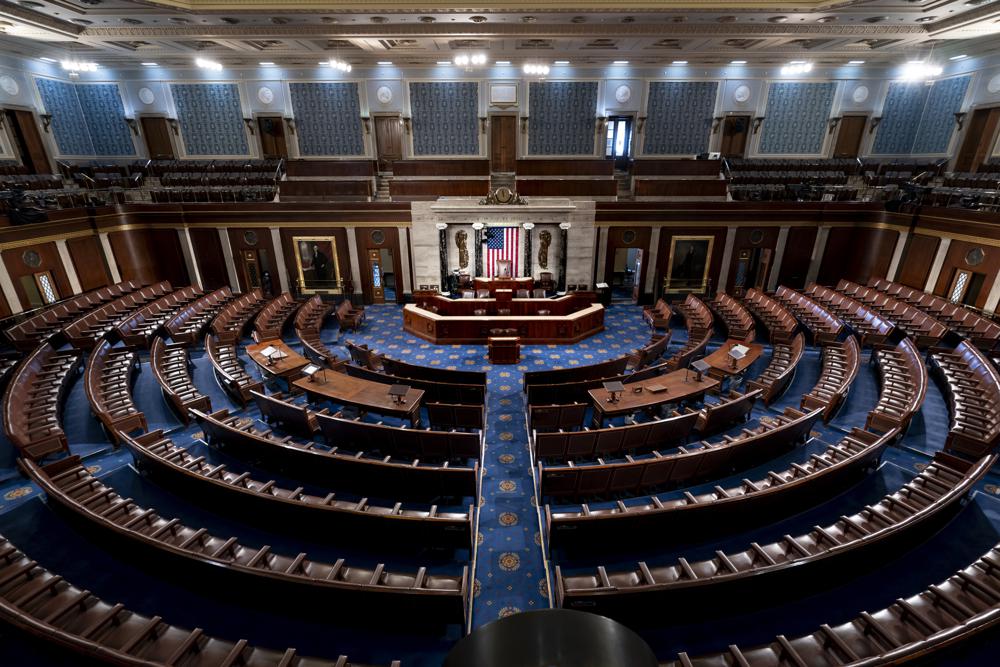
Jennifer Shutt, Alabama Reflector WASHINGTON — The U.S. House took a broadly bipartisan vote Tuesday to fund the government into the new year, though the measure must pass the Senate by the end of the week if Congress is going to avoid a partial government shutdown. The 336-95 House vote was the first major legislative test for Speaker Mike Johnson, the Louisiana Republican who took on the role after the former speaker was ousted after passing a similar bipartisan short-term funding bill in late September. A total of 93 House Republicans voted against the bill, but enough Democrats supported it to send the measure to the Senate. In the Alabama delegation, U.S. Reps. Robert Aderholt, R-Haleyville; Terri Sewell, D-Birmingham, and Dale Strong, R-Madison, voted for the bill. U.S. Reps. Jerry Carl, R-Mobile; Barry Moore, R-Enterprise; Gary Palmer, R-Hoover and Mike Rogers, R-Saks, voted against it. Senate Majority Leader Chuck Schumer, a New York Democrat, said Tuesday that he and Minority Leader Mitch McConnell, a Kentucky Republican, both agree the Senate needs to pass the bill quickly to avoid a funding lapse. “If the House should pass it, and I hope they do, Leader McConnell and I will figure out the best way to get this done quickly,” Schumer said. During a press conference prior to the vote, Johnson defended his decision to move the short-term spending bill, saying it would prevent Congress from passing an omnibus spending package in mid-December before the holiday break. Republicans have repeatedly said they oppose such massive packages, which wrap together all 12 government spending bills, often on short notice. He rejected criticism from fellow GOP lawmakers that he was making a mistake and taking the wrong approach to funding the government. “We’re not surrendering, we’re fighting. But you have to be wise about choosing the fights,” Johnson said. “You’ve got to fight fights that you can win, and we’re going to, and you’re going to see this House majority stand together on our principles.” Johnson said he was optimistic that Congress would be able to pass the dozen full-year appropriations bills before the new deadlines next year, avoiding the need for another stopgap spending bill. “Part of the reason I’m confident about this is, I’ve been drinking from Niagara Falls for the last three weeks. This will allow everybody to go home for a couple of days for Thanksgiving,” Johnson said. “Everybody can cool off.” During that time, Johnson said he would get a group together to “map out that plan to fight for” conservative principles in the final set of 12 spending bills. The current fiscal year ends on September 30, 2024. “I look forward to rolling that out,” he said. “You’ll see much more of that.” Two deadlines The 32-page short-term spending bill, sometimes called a continuing resolution or CR, would fund part of the federal government through January 19 and the remainder of the annual appropriations bills through February 2. The short-term funding measure is intended to give Congress and the White House more time to negotiate the dozen full-year spending bills. But there are several pitfalls along the way. Former GOP Speaker Kevin McCarthy was ousted from his leadership role after moving the short-term government funding bill in late September that will keep the federal government up and running through Friday. The decision by eight House Republicans and Democrats to vote to “vacate the chair” plunged the chamber into gridlock for weeks as GOP lawmakers debated who should lead the party. After nominating three Republicans who couldn’t get the votes on the floor to hold the gavel, the party finally coalesced behind Johnson. But some of the especially conservative members became frustrated this week with his decision to put the stopgap spending bill on the floor. The short-term spending bill would give the House and Senate until January 19 to work out an agreement on the Agriculture-FDA, Energy-Water, Military Construction-VA, and Transportation-HUD spending bills. The remaining eight spending bills — Commerce-Justice-Science, Defense, Financial Services, Homeland Security, Interior-Environment, Labor-HHS-Education, Legislative Branch, and State-Foreign Operations — would have funding until February 2. The House and Senate would need to reach an agreement well before those deadlines on the total amount of spending for the current fiscal year that began back on October 1. The leaders of the Appropriations committees would then determine how much of the money goes to each of the dozen bills. Democrats have said the total spending level should match what Congress and President Joe Biden agreed to in the debt limit law this summer. But some Republicans have pressed for lawmakers to go below that level. Lawmakers sound off on spending Idaho Republican Rep. Mike Simpson, chair of the Interior-Environment spending panel, said that leaders need to clarify the total spending number, though he expects that will ultimately match the debt limit law. “I think it will end up being that, but leadership needs to tell us,” Simpson said. Georgia Rep. Sanford Bishop Jr., the top Democrat on the Agriculture spending panel, said the total spending level for the final slate of bills that the House and Senate will negotiate in the coming weeks and months needs to adhere to the number in the debt limit law. “Some of them, particularly the MAGA Republicans, pretty much don’t agree with it. They want to cut much more drastically than is beneficial for the American people,” Bishop said. “The moderate, reasonable minds of that side think that we probably should do something that is reasonable.” Maryland Rep. Steny Hoyer, the top Democrat on the Financial Services spending panel, said a key challenge to getting full-year bills agreed to is that “Republicans have been unable for eight or nine months to get their act together on fiscal issues.” “And we’d lost a speaker over that,” Hoyer said. “They were unable to elect speakers for some period of time, and there is still no guarantee that we know what the overall spending levels are.” Ohio Democratic Rep. Marcy Kaptur, ranking member
Tommy Tuberville and colleagues introduce the Secure the Border Act of 2023
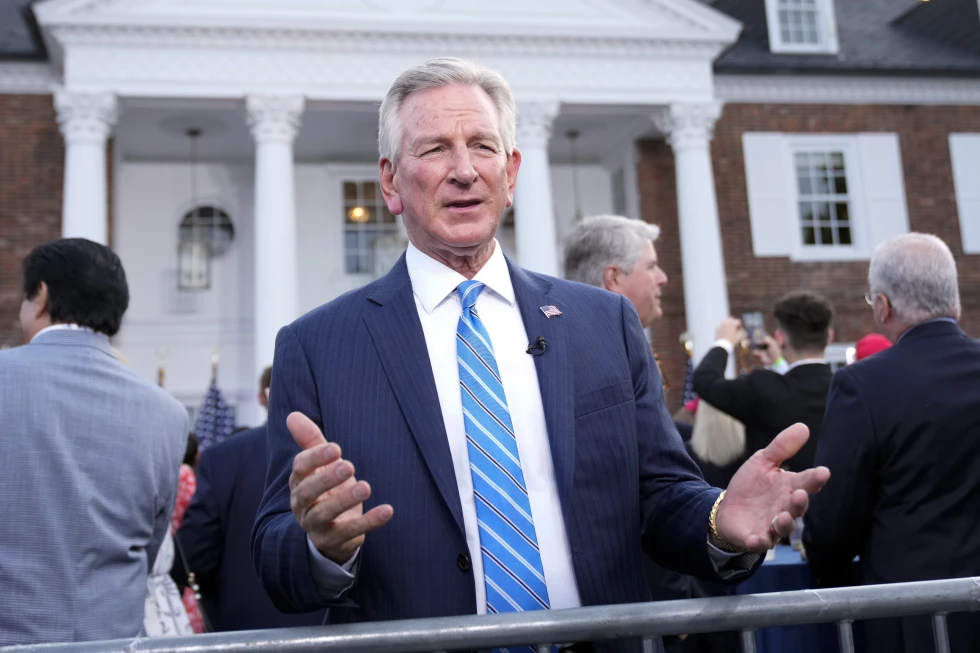
U.S. Senator Tommy Tuberville (R-Alabama) on Friday joined U.S. Senators Katie Britt (R-Alabama), Ted Cruz (R-Texas), and fifteen other U.S. Senate colleagues in introducing the Secure the Border Act of 2023 to combat the border crisis. This bill is the Senate companion to legislation passed by the U.S. House of Representatives earlier this year, commonly known as H.R. 2, which would resume construction on the wall at our southern border, tighten asylum standards, criminalize visa overstays, increase the number of Border Patrol Agents, defund non-government organizations receiving tax dollars to help traffic illegal immigrants throughout the country and prohibit the U.S. Department of Homeland Security (DHS) from using its app to assist illegal immigrants. “The crisis at our southern border gets worse with each passing day under Joe Biden’s watch,” said Sen. Tuberville. “Americans are tired of sending taxpayer dollars to help other countries secure their borders while leaving the floodgates open at ours. We are losing people every day to fentanyl and other deadly drugs that are pouring across the border. This madness must stop. I’m proud to join my Senate colleagues to introduce this legislation, and hope those on the other side of the aisle will help us address this severe national security issue.” “We have to acknowledge the problem before we can solve it, but President Biden hasn’t even been willing to do that,” Sen. Britt said. “With a record number of Americans dying from fentanyl poisoning, record deaths among migrants attempting to cross the border, record profits by the cartels, and a record amount of people on the terrorism watchlist apprehended at the border, there is no doubt that this is a crisis unlike which we have ever seen.” “Under Joe Biden, we have a wide-open southern border,” Sen. Cruz said. “The Biden Border Crisis has created the largest illegal immigration crisis in our nation’s history. Biden’s open borders are an invitation for the cartels to brutalize children, to assault women, to overrun our communities with illegal aliens, and to flood this country with narcotics and fentanyl that kill over 100,000 people per year. This bill would stop the Biden Border Crisis dead in its tracks by building the wall, ratcheting up asylum standards, increasing the number of Border Patrol Agents, and implementing effective border security policies.” Joining Senators Tuberville, Britt, and Cruz in the legislation are Senate Leader Mitch McConnell (R- Kentucky), Senate Judiciary Committee Ranking Member Lindsey Graham (R-South Carolina), and U.S. Senators Marsha Blackburn (R-Tennessee), Tom Cotton (R-Arkansas), JD Vance (R-Ohio), Roger Marshall (R-Kansas), Deb Fischer (R-Nebraska), Eric Schmitt (R-Missouri), Bill Hagerty (R-Tennessee), John Kennedy (R-Louisiana), John Hoeven, (R-North Dakota), Mike Lee (R-Utah), Ted Budd (R-North Carolina), Steve Daines (R-Montana), and Presidential candidate Tim Scott (R-South Carolina). The Secure the Border Act enacts effective border security solutions, including: · Requiring the Department of Homeland Security to resume border wall construction. · Increasing the number of Border Patrol Agents. · Tightening asylum standards by restricting asylum to only aliens who present at ports of entry and by requiring aliens to prove they are “more likely than not” to qualify for their asylum claim. · Narrowing DHS’s power to unilaterally grant parole to illegal aliens. · Criminalizing visa overstays by making the first offense a misdemeanor punishable by up to a $1,000 fine and the second offense a felony punishable by up to a $2,000 fine and up to two years imprisonment. · Stopping NGOs from using tax dollars to transport or lodge illegal aliens and provide illegal aliens with lawyers. · Restricting DHS from using its CBP One app to welcome illegal aliens into the country. · Requiring employers to use E-Verify. · Ensuring CBP has access to the criminal history databases of all countries of origin and transit so that CBP is aware of the criminal history of illegal aliens encountered at the southern border. Sen. Tuberville supports common-sense policies that strengthen our border and national security, like building the wall and reinstating the Migrant Protection Protocols, also known as the Remain in Mexico policy. With Democrats controlling the Senate, it is unlikely that they will allow this legislation to go to the floor, and if it did pass Congress, it is unlikely that President Biden will sign it. Senator Tommy Tuberville represents Alabama in the United States Senate and is a member of the Senate Armed Services, Agriculture, Veterans Affairs, and HELP Committees. To connect with the author of this story or to comment, email brandonmreporter@gmail.com.
House committee chairman Michael McCaul says Sen. Tommy Tuberville is ‘paralyzing’ the Pentagon by blocking promotions
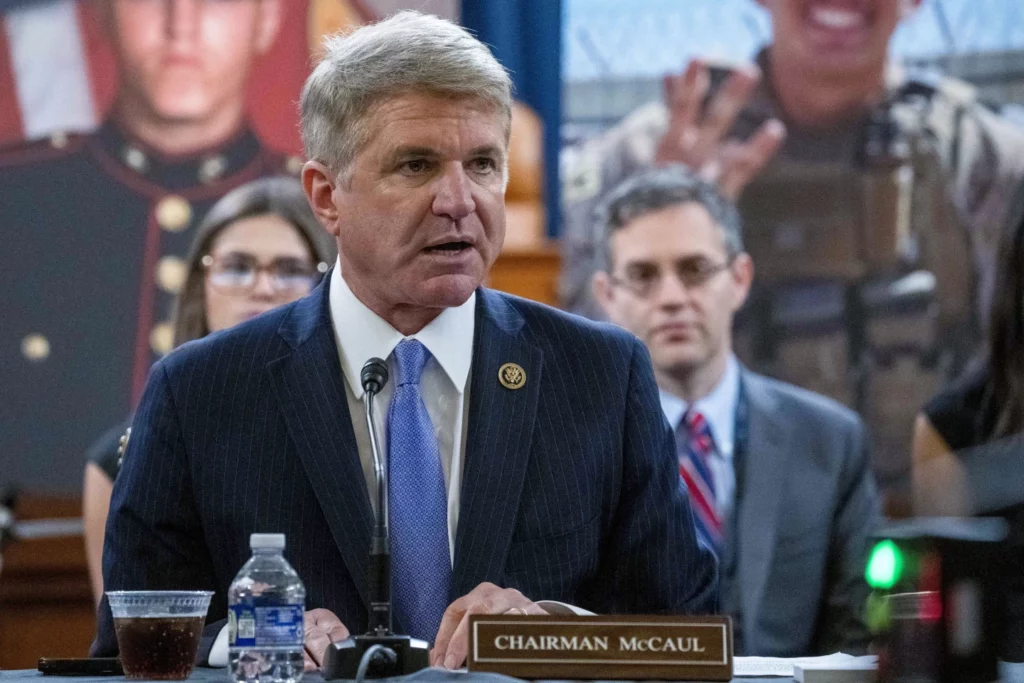
The chairman of the House Foreign Affairs Committee is slamming a fellow Republican in the Senate for waging an unprecedented attempt to change Pentagon abortion policy by holding up hundreds of military nominations and promotions. Rep. Michael McCaul, R-Texas, told CNN’s “State of the Union” on Sunday that Alabama Sen. Tommy Tuberville is “paralyzing the Department of Defense.” “The idea that one man in the Senate can hold this up for months, I understand, maybe promotions, but nominations,” McCaul said. He added, “I think that is a national security problem and a national security issue. And I really wish he would reconsider this.” Tuberville’s move has forced less experienced leaders into top jobs and raised concerns at the Pentagon about military readiness. Defense officials say Tuberville is jeopardizing American national security. Senators in both parties, including Republican leader Mitch McConnell of Kentucky, also have criticized Tuberville. Tuberville has refused to budge, saying will not drop the holds unless majority Democrats allow a vote on the policy. Democrats argue that a vote for every nominee could tie up the Senate floor for months, and they do not want to give in to Tuberville’s demands and encourage similar blockades of nominees in the future. McCaul said on CNN that the House would be tackling the issue of abortion in the military as part of a sweeping defense spending bill making its way through Congress. In the meantime, he said, “To hold up the top brass from being promoted and lower brass, I think, is paralyzing our Department of Defense.” Republished with the permission of The Associated Press.
Mitch McConnell tries to reassure colleagues about his health, vows to serve out term as Senate GOP leader
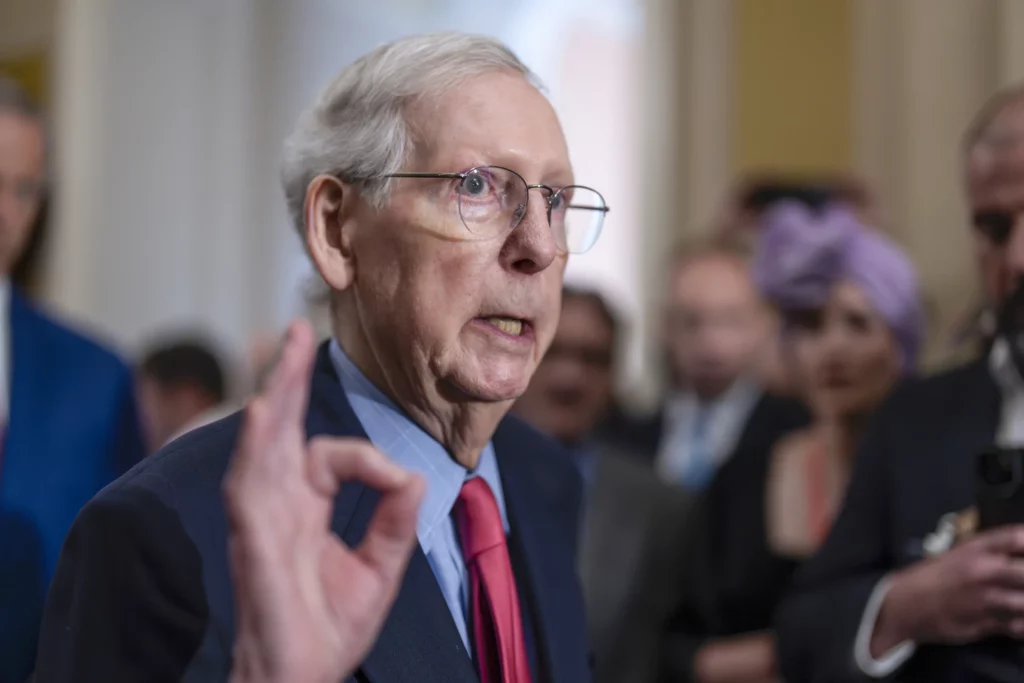
Senate Republican Leader Mitch McConnell declared again Wednesday that he plans to finish his term as leader despite freezing up at two news conferences over the summer, brushing off questions about his health as he sought to reassure colleagues he’s still up to the job. At a weekly, closed-door lunch with fellow GOP senators on Wednesday, McConnell pointed to the statement released a day earlier by attending physician Brian P. Monahan about his health. He said he was ready to move forward with the Senate’s busy fall agenda. Monahan’s statement, released by McConnell’s office, said there was no evidence that the 81-year-old McConnell had a stroke or was suffering from a seizure disorder after he froze up and appeared unable to speak for 20-30 seconds at two different news conferences. The episodes came after the GOP leader fell and suffered from a concussion earlier this year. “I’m going to finish my term as leader, and I’m going to finish my Senate term,” McConnell told reporters, dismissing questions and requests for more detail about his medical condition. “I have nothing to add” to Monahan’s statement, he said. McConnell’s words to the press and his colleagues were his latest efforts to assuage growing concerns about his health and silence questions about whether he can continue to lead his party in the Senate. The famously private Kentucky senator has faced some criticism from colleagues for remaining quiet about the incidents and his health, which has visibly declined since the concussion. Behind closed doors, McConnell told other Republicans that his health issues are linked to his concussion. He believes that is a “plausible answer” to the questions, Texas Sen. John Cornyn said. Cornyn said McConnell “hasn’t missed a step” in terms of his cognitive abilities or ability to lead. But “physically, it’s been tougher.” “He was more transparent, which I’m glad he did,” Cornyn said of McConnell’s comments at the private lunch. “This is not his style. But I don’t think keeping things close to the vest serves his interests, and it created a lot of speculation. So I think this is a positive development.” Other Republican senators also said they were satisfied with McConnell’s explanation for the two incidents, the first in Washington in July just before the August recess and the second in Kentucky last week. “I feel really good; I’m behind Mitch, and let’s move forward,” said Sen. Lindsey Graham, R-S.C. North Carolina Sen. Thom Tillis said McConnell has ”broad support, and I think that’s known by the majority of the conference.” North Dakota Sen. Kevin Cramer, who had called for more transparency from McConnell, said the leader’s remarks were “a strong message. It was confident on his part. It was very direct.” Alabama Sen. Tommy Tuberville said that as part of his remarks to the GOP conference, McConnell touted that he’d raised $49 million for Republican Senate candidates in August. “He convinced me” of his ability to lead, Tuberville said. Still, Tuberville said the circumstances could change. “I don’t think there will be anything else said about it unless there’s another incident,” Tuberville said. “And that’s what we’re hoping.” The letter from Monahan that McConnell released Tuesday said there is “no evidence that you have a seizure disorder or that you experienced a stroke, TIA or movement disorder such as Parkinson’s disease.” TIA is an acronym for a transient ischemic attack, a brief stroke. But there was no elaboration as to what did cause McConnell’s episodes. The doctor said the assessments entailed several medical evaluations including a brain MRI scan and “consultations with several neurologists for a comprehensive neurology assessment.” “There are no changes recommended in treatment protocols as you continue recovery from your March 2023 fall,” Monahan said. Even though the majority of GOP senators have supported McConnell, some have raised questions. Republican Sen. Rand Paul, a doctor, and McConnell’s Kentucky colleague, has questioned whether the episodes were really caused by dehydration, as McConnell’s aides and the Capitol doctor have implied. After attending the lunch, Paul said he had no comment. Missouri Sen. Josh Hawley said he’s concerned about the leader’s health, adding that his health issues could undermine Republican arguments that President Joe Biden, 80, is too old for another term in office. “I mean, if you’re concerned about the president’s ability to do his job, and I am, and a lot of Republicans say they are, then you’ve got to be concerned when it’s somebody from your own party,” Hawley said. The top potential successors to McConnell as leader — Cornyn, South Dakota Sen. John Thune and Wyoming Sen. John Barrasso — have stood by him. “He was very strong, sharp in the lunch today,” said Thune, the No. 2 Republican leader. “He talked a lot about not just (his health) but the other issues we’re dealing with here in the Senate. I think everybody left feeling very good about where he’s at.” First elected to the Senate in 1984 and as leader in 2007, McConnell became the longest-serving Senate party leader in January. He would have to run again for leader after next year’s elections, and his next reelection to the Senate would be in 2026. McConnell will be a central figure as Congress returns from an extended summer break to a flurry of activity, most notably the need to approve funding to prevent any interruption in federal operations by Sept. 30, which is the end of the fiscal year. Some House Republicans are willing to shut down the government at the end of the month if they are unable to enact steep spending restrictions that go beyond the agreement Biden reached with Republican House Speaker Kevin McCarthy earlier this summer. Republished with the permission of The Associated Press.
Mitch McConnell freezes during news conference for second time this summer
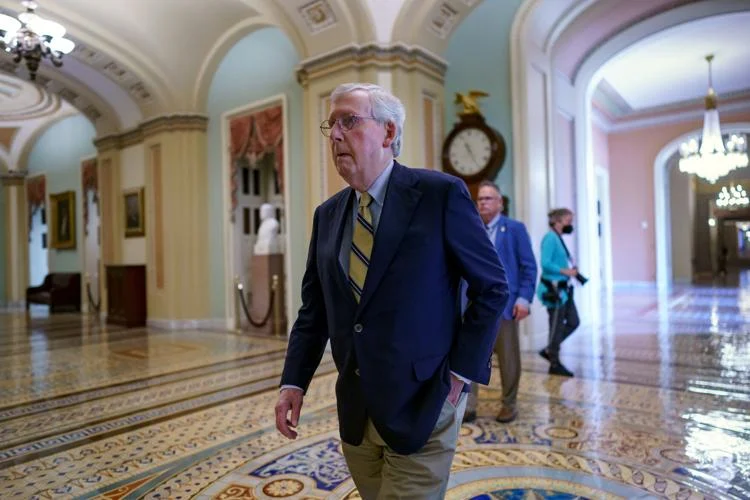
Senate Minority Leader Mitch McConnell, R-Ky., raised fresh concerns Wednesday when he froze during a news conference, the second time he has done so this summer. McConnell, 81, appeared to struggle to hear a question from a reporter about running for reelection during a news conference in Covington, Kentucky. After the question was repeated, McConnell gave a small chuckle and then froze, looking straight ahead. An aide then stepped in and repeated the question loudly in McConnell’s ear. McConnell continued to stare ahead. The aide then told the gathering of reporters they would need a minute. After a pause, McConnell took another question about Kentucky’s attorney general, Daniel Cameron, a Republican who is running for governor. McConnell said he thought the governor’s race would be close but spoke quietly through the response before being led away from the cameras. It was the second such incident this summer. On July 26, in the middle of his remarks to the media, McConnell stared ahead and stopped talking. After an awkward pause, fellow lawmakers ushered him to his office. After that incident, McConnell returned to answer questions, telling reporters he was “fine.” McConnell suffered a fall and ensuing concussion and broken rib earlier this year. Republished with the permission of The Center Square.
Sen. Mitch McConnell freezes during press conference, raises concerns
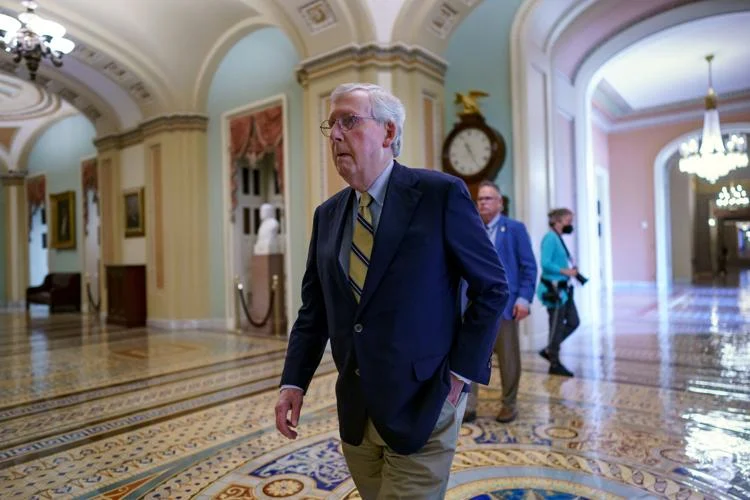
Senate Minority Leader Mitch McConnell, R-Ky., raised concerns Wednesday when he froze during a news conference. In the middle of his remarks to the media, McConnell stared ahead and stopped talking. After an awkward pause, fellow lawmakers ushered him to his office. “Hey Mitch, anything else you want to say, or should we just go back to your office?” Sen. John Barrasso, R-Wyo., said to McConnell. “Do you want to say anything else to the press?” McConnell returned to answer press questions, telling reporters he was “fine.” McConnell, 81, suffered a fall and ensuing concussion and broken rib earlier this year. Q: “Could you address what happened here at the start of the press conference and was it related to your injury from earlier this year where you suffered a concussion?” Sen. McConnell: “I’m fine.” Q: “You’re fine? You’re fully able to do your job?” McConnell: “Yeah.” pic.twitter.com/Can1RtzqmM— CSPAN (@cspan) July 26, 2023 Republished with the permission of The Center Square.
More than 5,000 veterans voice support for Tommy Tuberville’s hold on military promotions
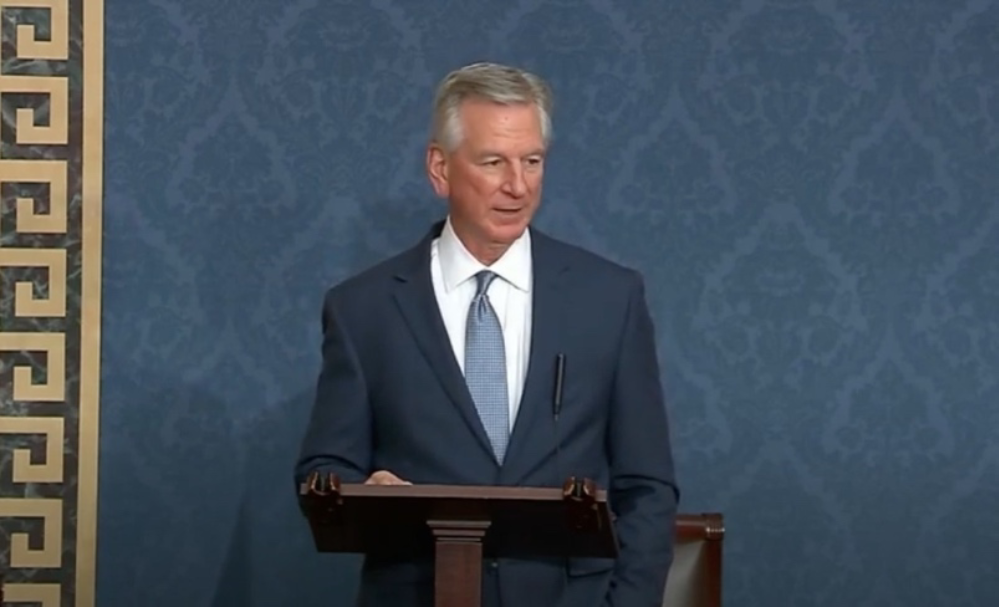
U.S. Senator Tommy Tuberville (R-Alabama) has been denounced by President Joe Biden, congressional Democrats, senior leaders at the Department of Defense (DoD), and the mainstream media for his refusal to give unanimous consent to senior military and DoD civilian promotions over his objection to Biden era rules on ensuring abortion access. Tuberville, however, says he is receiving strong veteran support for his standoff with President Biden and Defense Secretary Lloyd Austin over the department’s decision to pay for abortion-related expenses for servicemembers using taxpayer dollars. Tuberville announced on Tuesday that he had received more than 5,000 veterans expressing their support for Senator Tuberville’s decision to place a hold on Pentagon general and flag officer promotions, joining a growing army of those backing the senator. Tuberville recently forwarded a letter to Senate Majority Leader Chuck Schumer (D-New York) and Senate Minority Leader Mitch McConnell (R-Kentucky). The letter from the veterans outlined the need for a strong military that is focused on fighting to preserve life rather than end it. “As current and former service members of the United States Military, and organizations which support and advocate for the safety and well-being of our service members, we firmly support Senator Tuberville’s position of holding civilian, general, and flag officers from confirmation by unanimous consent until the DoD rescinds its recently instituted policy of subsidizing abortion,” the veterans wrote. “The undersigned stand united in condemning this policy. This policy is not just illegal, it shamefully politicizes the military, circumvents the authority of Congress, and exceeds the authority of the Department of Defense.” “While some claim that Sen. Tuberville’s position is negatively impacting military readiness, the Department of Defense has failed to present any evidence that substantiates this claim,” the veterans continued. “To the contrary, it appears true that the politicized agenda of Secretary Austin and the Biden administration are significantly diminishing military readiness. The American people, including its servicemembers, are disappointed by President Biden and Secretary Austin’s recent decisions to mandate receipt of the COVID-19 vaccines, promote the radical LGBT agenda, and now subsidize abortion. Because of these policies, the military now faces an unprecedented crisis of recruitment – missing its recruitment goal for the first time ever last year. The focus of our military must be on keeping the American people safe, not advancing the left-wing social agenda.” “There is no truth more profound than the fact that all human life is sacred,” the Veterans added.“The mission of the United States Military is to defend and protect all American lives – not subsidize the practice of destroying innocent and vulnerable American children via abortion with taxpayer dollars. By pledging to hold these nominations to the Department of Defense until administration officials reverse course, Senator Tuberville is doing a great service for the American people – including its service members.” Tuberville meanwhile cites what he says is growing support for his position among Republican members of Congress. Tuberville has 20 statements of support from members of Congress. “Thank you, Senator Tuberville, for standing up for American taxpayers, who are being forced to fund abortion through the DoD. As threats against our country continue to grow, the DoD should be focused on protecting Americans instead of being an abortion travel agency,” said U.S. Rep. Barry Moore (R-AL-02). “Senator Tuberville is not blocking them on the floor. He is just saying you can’t do them by unanimous consent because President Biden has created this new abortion policy out of whole cloth. This is a moment where Senator Schumer is just trying to embarrass Senator Tuberville. Senator Tuberville is strong and passionate about the value of children and sees this as important,” said U.S. Senator James Lankford (R-Oklahoma). Sen. Tuberville was elected to the Senate in 2020. To connect with the author of this story or to comment, email brandonmreporter@gmail.com.
Mitch McConnell and other Republican Senators denounce White nationalism after Tommy Tuberville’s refusal to denounce White nationalists as racists

U.S. Senator Tommy Tuberville (R-Alabama) is being widely criticized for his comments on White nationalists in a recent CNN interview. On Tuesday, U.S. Sen. Mitch McConnell (R-Kentucky) responded, saying there is no place for White nationalists in the military or the country. “White supremacy is simply unacceptable in the military and in our whole country,” McConnell told reporters. The number two Republican in the Senate, Minority Whip John Thune (South Dakota), said there’s no room for white nationalists in the GOP or the military. “I just think there isn’t any place for it,’ Thune said. “We are a country obviously that has built around a set of principles that’s welcoming.” “Ethnic nationalism is un-American, and I think it would be problematic in the military,” said Sen. Marco Rubio (R-Florida). “My definition of a White nationalist is someone that believes that America belongs to white people. That’s not American, that’s un-American, and that would be a problem in the military,” “White supremacy and racism have absolutely no place in our country. Period. The end,” Sen. Katie Britt (R-Alabama) told reporters. This controversy began during an NPR interview in Alabama when Tuberville was asked if White nationalists should be able to serve in the military. “Well, they call them that. I call them Americans,” Tuberville answered. Tuberville followed those comments with an interview Monday on CNN. CNN host Kaitlan Collins said a White nationalist is “someone who believes that the white race is superior to other races.” “Well, that’s some people’s opinion,” Tuberville responded. “My opinion of a White nationalist, if someone wants to call them a White nationalist, to me, is an American. It’s an American. Now, if that White nationalist is a racist, I’m totally against anything that they want to do because I am 110 percent against racism.” Tuberville said White nationalism is “just a cover word for the Democrats now where they can use it to try to make people mad across the country.” Senate Majority Leader Chuck Schumer (D-New York) chastised Tuberville for his opinion, “The senator from Alabama is wrong, wrong, wrong. The definition of White nationalism is not a matter of opinion. “For the Senator from Alabama to obscure the racist nature of white nationalism is indeed very, very dangerous,” Schumer said. “He is fanning the flames of bigotry and intolerance.” “I don’t think Senator Tuberville is in any way racist,” said Sen. Mitt Romney (R-Utah) when asked about Tuberville. “I am totally against anything racist,” Tuberville emphasized. “My opinion of a White nationalist, if you want to call them that, is an American.” Tuberville chastised Democrats for dividing this country and making it weaker. This is not the first gaffe that Tuberville has made on the national stage. Tuberville was criticized in October when he seemed to be saying those Americans who want reparations for slavery are responsible for committing crimes. “They’re not soft on crime. They’re pro-crime. They want crime,” Tuberville said of Democrats. “They want crime because they want to take over what you got. They want to control what you have. They want reparations because they think the people that do the crime are owed that. Bulls**t. They are not owed that.” Tuberville was in Nevada campaigning for GOP Senate candidate Adam Laxalt. Laxalt lost to incumbent Sen. Catherine Cortez-Masto 48.9 to 48.0% a month later. Tuberville has also been widely criticized for his hold on military promotions over the Pentagon’s controversial abortion policy. Tuberville has refused to vote yes on unanimous consent to the promotions over his opposition to the Biden administration’s efforts to thwart pro-life state laws for military members and their families. Despite the criticism from Washington, the Hill reports that Tuberville remains overwhelmingly popular in Alabama, with a commanding majority of Alabamians holding favorable views of the senior Senator from Alabama. To connect with the author of this story or to comment, email brandonmreporter@gmail.com.

